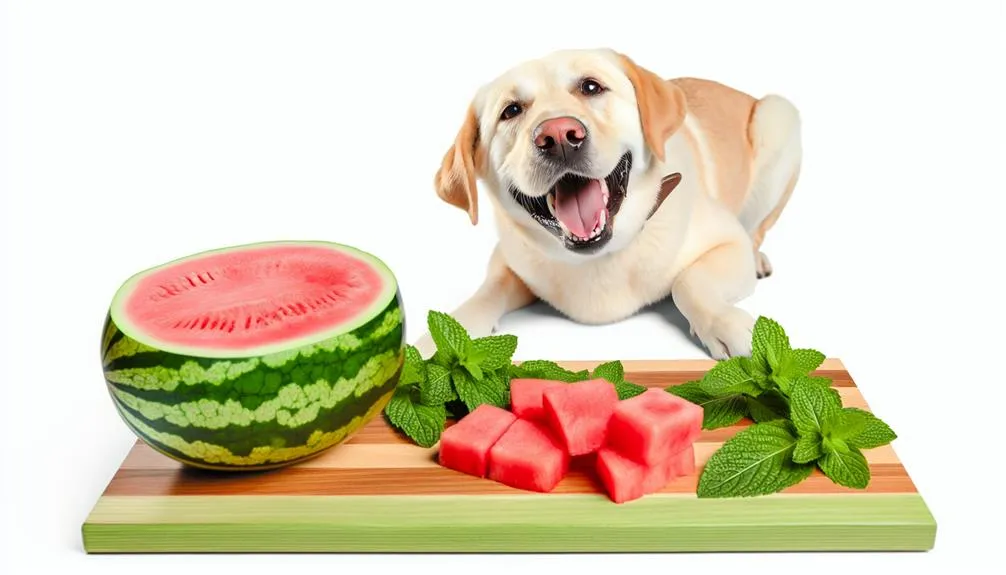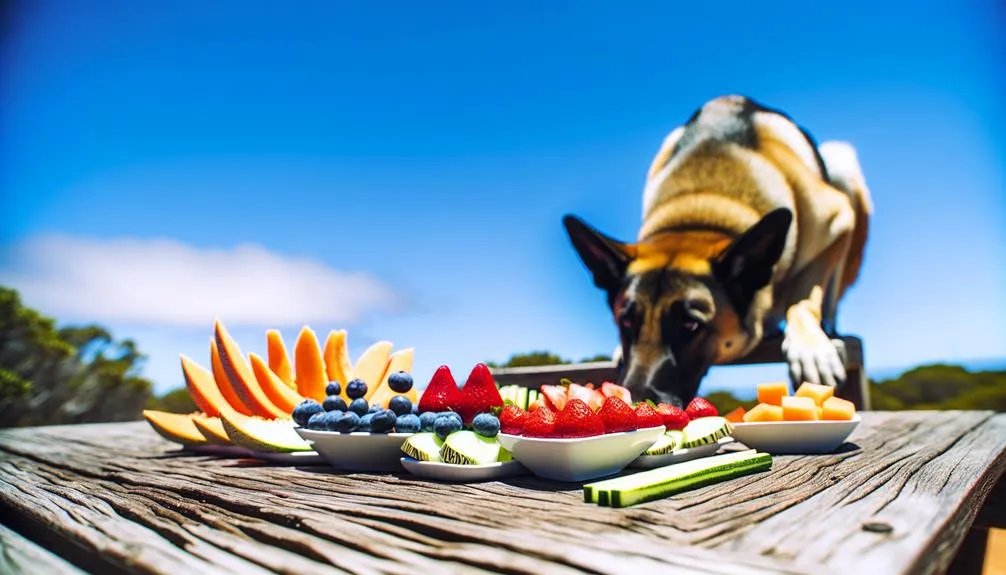
Can Dogs Eat Watermelon
You might be wondering whether it's safe to share that juicy slice of watermelon with your dog. While this summer favorite can offer some Nutritional benefits, there are important precautions to evaluate before you hand it over. From the right preparation to potential risks, knowing how to introduce this treat can make a difference in your dog's health. What should you keep in mind when deciding if watermelon is a good choice for your furry friend?
Nutritional benefits of Watermelon
When considering Healthy treats for your dog, watermelon stands out due to its impressive nutritional profile. This fruit is not only delicious but also offers numerous health benefits that can enhance your dog's overall well-being. One of the most notable advantages of watermelon is its hydration benefits. Composed of approximately 92% water, it serves as an excellent source of hydration, especially during hot weather or after exercise. Keeping your dog hydrated is essential for maintaining peak health, and watermelon can be a invigorating, low-calorie option.
In addition to its high water content, watermelon boasts a variety of vitamins that contribute to your dog's nutritional intake. It is rich in vitamins A, B6, and C, all of which play important roles in supporting your dog's immune system, promoting healthy skin, and improving vision. Vitamin A is crucial for eye health, while B6 aids in protein metabolism and cognitive function. Vitamin C, an antioxidant, helps combat oxidative stress, contributing to a healthier, more vibrant life.
Moreover, watermelon contains small amounts of potassium, which is important for maintaining nerve and muscle function. By including watermelon in your dog's diet, you can provide a nutritious treat that not only satisfies their taste buds but also contributes positively to their health. Just remember to remove any seeds and rind to guarantee your dog enjoys this fruity snack safely.
Risks of Feeding Watermelon
While watermelon is generally safe for dogs, there are some risks to contemplate before adding it to their diet. One key concern is watermelon toxicity, which can occur if your dog consumes the seeds or rind. The seeds can cause intestinal blockage, particularly in smaller breeds, while the rind can lead to gastrointestinal distress. It's important to guarantee that only the flesh of the watermelon is offered to your dog.
Another risk involves potential Digestive issues. Watermelon is high in fiber, and while fiber is beneficial in moderation, too much can lead to diarrhea or an upset stomach. If your dog is not accustomed to high-fiber foods, introducing watermelon suddenly could result in these digestive problems. Additionally, some dogs may have sensitivities to certain fruits, and watermelon could trigger an allergic reaction in those cases.
When feeding watermelon, you should also consider the portion size. Offering large quantities at once can overwhelm your dog's digestive system, leading to discomfort or more severe Digestive issues. It's advisable to start with a small piece and monitor your dog's reaction.
How to Prepare Watermelon for Dogs

Preparing watermelon for your dog involves a few simple yet significant steps to guarantee safety and enjoyment. First, select a ripe watermelon, as unripe fruit may not be safe for consumption. Once you've chosen a suitable watermelon, wash the exterior thoroughly to remove any pesticides or contaminants that could pose a risk to your dog.
Next, carefully cut the watermelon in half, ensuring your knife is sharp and the surface is stable to prevent accidents. After slicing, remove the rind completely, as it can be difficult for dogs to digest and may lead to gastrointestinal issues. Additionally, be sure to eliminate any seeds, as they can cause blockages and discomfort in your pet's digestive system.
For ideal watermelon preparation, cut the flesh into small, manageable chunks that your dog can easily chew and swallow. This step is essential for dog safety, as larger pieces can pose choking hazards. If your dog is particularly small or has dental issues, consider mashing the watermelon into a puree to make it easier for them to enjoy.
Serving Sizes for Dogs
Determining the appropriate serving sizes of watermelon for your dog is crucial for their health and well-being. Watermelon can be a invigorating treat, but it's essential to practice portion control based on your dog's size and dietary needs.
For smaller dog breeds, a few small cubes or a few spoonfuls of watermelon flesh can be sufficient. You want to introduce watermelon gradually, starting with just a small amount to see how your dog reacts. As a rule of thumb, aim for about 1 to 2 ounces of watermelon, which is roughly equivalent to 1/8 of a cup, for smaller dogs weighing under 20 pounds.
For medium-sized dogs, like Beagles or Cocker Spaniels, you can increase the serving size to about 2 to 4 ounces or 1/4 to 1/2 of a cup. Larger breeds, such as Labradors or German Shepherds, can typically handle larger portions, around 4 to 6 ounces, or 1/2 to 3/4 of a cup, while still keeping an eye on their overall caloric intake.
Always remember that watermelon should only be an occasional treat and not a significant part of their diet. Excessive amounts can lead to gastrointestinal issues, including diarrhea, due to the high water and sugar content. Monitoring Portion sizes according to your dog's size will help guarantee they enjoy watermelon safely and healthily.
Alternatives to Watermelon

If you're looking for healthy alternatives to watermelon for your dog, there are plenty of fruits and vegetables that can provide similar benefits without the potential Digestive issues. While watermelon is hydrating and low in calories, other Fruit alternatives can also be invigorating and nutritious.
Blueberries are an excellent choice; they're packed with antioxidants and vitamins while being low in sugar. Dogs often enjoy their sweet and slightly tart flavor. Another great option is cucumber. This vegetable is crunchy, hydrating, and low in calories, making it an ideal safe snack for your furry friend. Additionally, you can consider cantaloupe. This fruit is rich in vitamins A and C, plus its high water content helps keep your dog hydrated.
If you're looking for more vegetable options, consider carrots. They're not only low in calories but also high in fiber and essential nutrients. Dogs typically enjoy their crunchy texture, and they can help promote dental health as well. Bell peppers, especially the red variety, are also safe snacks that provide a wealth of vitamins and antioxidants.
Always verify that any fruit or vegetable you offer is safe for dogs and free from toxic substances, such as seeds or pits. Remember to introduce new foods gradually to monitor for any adverse reactions. By exploring these Fruit alternatives, you can provide your dog with a variety of healthy and enjoyable treats that support their overall well-being.
Frequently Asked Questions
Can Dogs Eat Watermelon Seeds Safely?
Watermelon seeds can pose concerns for dogs due to potential choking hazards and Digestive issues. While watermelon offers benefits like hydration and vitamins, it's best to remove seeds before letting your dog enjoy this treat.
Is Watermelon Safe for Puppies?
Imagine a vibrant garden, bursting with nourishment. For your puppy, watermelon can be a safe treat, offering hydration and vitamins. However, moderation's key, as puppy nutrition requires careful balance to guarantee their healthy growth.
Can Dogs Be Allergic to Watermelon?
Yes, dogs can be allergic to watermelon. Allergic reactions may occur during watermelon digestion, leading to symptoms like itching or gastrointestinal distress. Always observe your dog for any unusual reactions after introducing new foods.
What Are the Signs of Watermelon Toxicity in Dogs?
While watermelon's benefits include hydration, be cautious. If your dog shows signs like vomiting, diarrhea, or lethargy, it might indicate toxicity symptoms. Remember, moderation is key to ensuring your pet's safety and health.
How Often Can I Give My dog Watermelon?
You can give your dog watermelon occasionally, about once or twice a week. This fruit offers hydration and vitamins, but serve small, seedless portions to avoid Digestive issues and maximize watermelon benefits for your pet.
Conclusion
To summarize, dogs can safely enjoy watermelon as a revitalizing treat, but it's crucial to prepare it correctly and serve it in moderation. Remember, "an ounce of prevention is worth a pound of cure." By removing the rind and seeds and monitoring your dog for any adverse reactions, you can guarantee a Healthy snack that provides hydration and vital vitamins. Always consult with your veterinarian before introducing new foods to your dog's diet for ideal health.
You may also like
Archives
Calendar
| M | T | W | T | F | S | S |
|---|---|---|---|---|---|---|
| 1 | 2 | 3 | 4 | 5 | 6 | |
| 7 | 8 | 9 | 10 | 11 | 12 | 13 |
| 14 | 15 | 16 | 17 | 18 | 19 | 20 |
| 21 | 22 | 23 | 24 | 25 | 26 | 27 |
| 28 | 29 | 30 | ||||
Leave a Reply